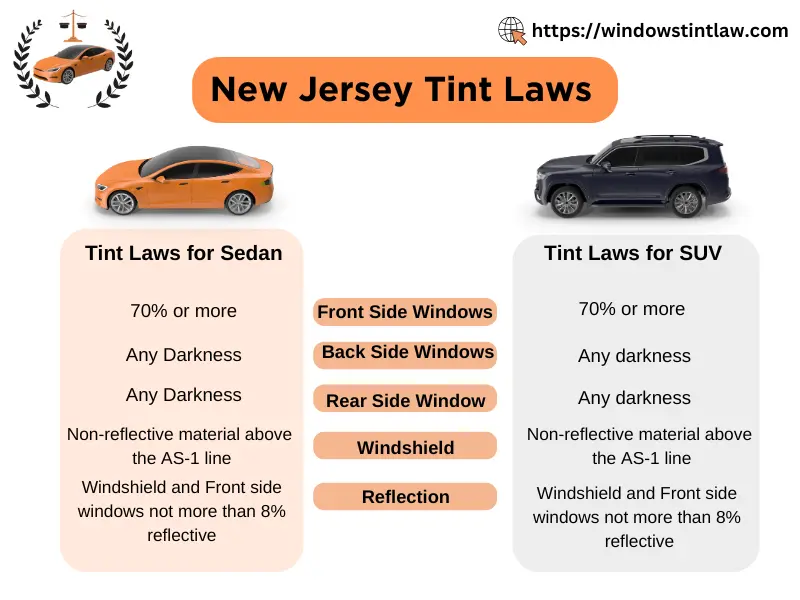New Jersey Tint laws were legislated in 2003 for the safety of drivers and passenger while travelling on roads and highways.
New Jersey window tinting rules do not allow to apply sun screening or tinting materials on the front windshield reducing the transmittance of Visible Light below Seventy percent. However, Tinting material may be installed or applied to the AS-1 portion of windshield to reduce the impact of sunrays. Sun screening or tinting material of any darker shade can be applied to back side windows and rear window.
Tinted windows offers multiple benefits but obeying NJ tint laws is mandatory to avoid tint tickets.
Overview of New Jersey Tint Laws
The below infographic outlines the window tint laws of New Jersey for Cars and SUVs or Trucks. Drivers are advised to follow these rules to avoid getting pulled over by the police.

Darkest Legal Tint in New Jersey
Vehicles owners or drivers in New Jersey must obey the below Window Tinting rules. Secondly, The same tint darkness and tint reflection rules are applicable to Cars and SUVs or Multi-purpose vehicles.
| State | Front Side Windows | Back Side Windows | Rear Window | Windshield | Tint Reflection | Other Restrictions |
| New Jersey | 70% or more | Any darkness | Any darkness | Non-reflective tint material above the AS-1 line. | Front side windows and Windshield must not be reflective more than 8 percent. | Both side mirrors are mandatory if rear window is tinted. |
Window Tint Reflection
The Visible Light Reflectance of Tinting or Sun screening materials applied to Windshield and front side windows must not exceed more than Eight percent. The same rule is imposed to Sedan and SUV type vehicles.
Hence, Vehicle owners must install the non-reflective type of tinting materials to stay away from hefty fines.
Other Rules and Regulations
There are some other rules which are required to follow for vehicles with tinted windows:
- Dual side mirrors: Dual side mirrors are required.
- Restricted Tint Colors: No tint colors are specifically restricted in NJ Tint laws.
- Certificates: Manufacturers are required to sell the legal tinting materials in the state.
- Stickers: A sticker or label of one inch in size is required to display between the window and film on the front side windows and windshield. Label shall be attached to the lower left corner and it must display the installer details.
Medical Exemption
New Jersey state allows to install lower tint due to certain medical conditions. The medical exemption application form shall be signed and certified by the licensed physician or doctor, which must state the medical condition that requires applicant to get shielded from direct sunlight.
Submit the completed application with a valid prescription to:
Customer Advocacy Office
Attn: Sun screening Exemption
PO Box 403
Trenton, NJ 08666-0403
or email at Sunscreening@mvc.nj.gov.
After reviewing by the medical review board, eligible applicants shall get a medical exemption certificate for the period of 48 months.
Furthermore, A medical exemption certificate shall become invalid upon the sale of or termination of lease for the motor vehicle for which medical exemption was issued. The owner or lessee of a motor vehicle for which a medical exemption certificate has been issued is responsible for removing the sun-screening materials from the windshield and front side windows prior to sell the vehicle.
Lastly, The medical exemption certificate must be kept in the vehicle at all the times.
Penalties for Violating Tint Laws
According to the New Jersey Statutes Title 39 Motor Vehicles and Traffic Regulations § 3-75.3 Any person who violates the provisions of Tint regulations shall be subject to fine not more than $1000 for the first offense. The second and subsequent offense may not be fined with amount exceeding $5000.
NJ State police can test the window tints, if found illegal, issue the tickets to the violator of tinting rules.
